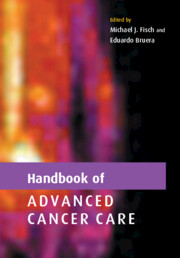Book contents
- Frontmatter
- Contents
- List of contributors
- Preface
- Acknowledgements
- PART I General concepts in oncology
- Part II Primary tumors
- Part III Management of specific symptoms and syndromes
- 41 Assessment of pain
- 42 Drugs for managing cancer pain
- 43 Difficult pain management problems
- 44 Dyspnea
- 45 Loss of appetite and weight
- 46 Fatigue
- 47 Depression and anxiety
- 48 Delirium
- 49 Constipation
- 50 Palliation of fever and sweats: the heat is on!
- 51 Bleeding in advanced cancer patients
- 52 Thrombosis
- 53 Hypercalcemia of malignancy
- 54 Lymphedema
- 55 Wound care of the advanced cancer patient
- 56 Infections in patients with advanced cancer
- 57 Urogenital complications
- 58 Brain metastases
- 59 Bowel obstruction
- 60 Bone metastases
- 61 Meningeal cancer
- 62 Pleural and pericardial effusions
- 63 Superior vena cava syndrome
- 64 Chronic nausea
- Index
- References
49 - Constipation
Published online by Cambridge University Press: 04 August 2010
- Frontmatter
- Contents
- List of contributors
- Preface
- Acknowledgements
- PART I General concepts in oncology
- Part II Primary tumors
- Part III Management of specific symptoms and syndromes
- 41 Assessment of pain
- 42 Drugs for managing cancer pain
- 43 Difficult pain management problems
- 44 Dyspnea
- 45 Loss of appetite and weight
- 46 Fatigue
- 47 Depression and anxiety
- 48 Delirium
- 49 Constipation
- 50 Palliation of fever and sweats: the heat is on!
- 51 Bleeding in advanced cancer patients
- 52 Thrombosis
- 53 Hypercalcemia of malignancy
- 54 Lymphedema
- 55 Wound care of the advanced cancer patient
- 56 Infections in patients with advanced cancer
- 57 Urogenital complications
- 58 Brain metastases
- 59 Bowel obstruction
- 60 Bone metastases
- 61 Meningeal cancer
- 62 Pleural and pericardial effusions
- 63 Superior vena cava syndrome
- 64 Chronic nausea
- Index
- References
Summary
The moment you reach this page half of the job is done: considering the diagnosis of constipation.
How frequent is constipation in patients with advanced cancer? Epidemiology and definition
Several studies have documented the frequency of symptoms in patients with advanced cancer. However, constipation is not a symptom, such as pain or dyspnea, but a diagnosis, such as a fracture causing pain or hypoxemia causing dyspnea, respectively. Therefore only data from institutions assessing and documenting constipation routinely are reliable, but they seldom include all groups of patients with advanced cancer. Even less is known about the frequency of symptomatic constipation, i.e., which has an impact on quality of life, in contrast to asymptomatic constipation. Overall, both asymptomatic and symptomatic constipation are widely underestimated, even in specialized palliative care settings.
The range of the “normal frequency” of bowel movements, i.e., up to three bowel movements per day and more than one bowel movement every third day, illuminates the individual variation. Therefore each patient should be asked about “normal” bowel habits before the actual disease, as well as about meaningful changes both compared with “normal” and with the last few weeks or days. However, in light of the paradox of “overflow” diarrhea, or the case of diminishing stool volumes in the context of dehydration, the number of bowel movements does not reliably predict the presence of symptomatic constipation. A diagnosis of constipation (Table 49.1) has to include stool volume and quality.
- Type
- Chapter
- Information
- Handbook of Advanced Cancer Care , pp. 397 - 407Publisher: Cambridge University PressPrint publication year: 2003
References
- 2
- Cited by



